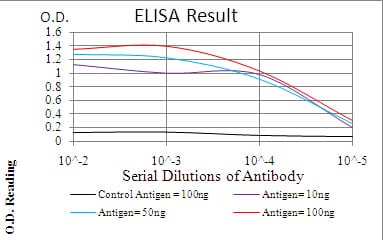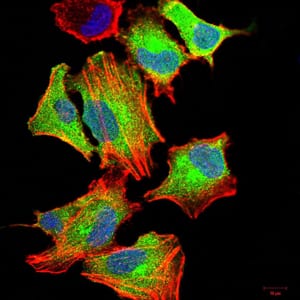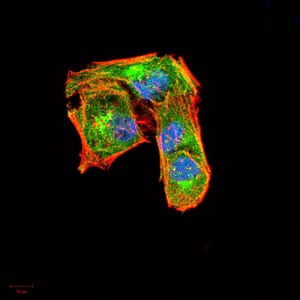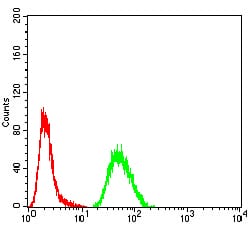



| WB | 咨询技术 | Human,Mouse,Rat |
| IF | 咨询技术 | Human,Mouse,Rat |
| IHC | 咨询技术 | Human,Mouse,Rat |
| ICC | 1/200 - 1/1000 | Human,Mouse,Rat |
| FCM | 1/200 - 1/400 | Human,Mouse,Rat |
| Elisa | 1/10000 | Human,Mouse,Rat |
| Aliases | GCSF; CSF3OS; C17orf33 |
| Entrez GeneID | 1440 |
| clone | 8G5F7 |
| WB Predicted band size | 22.3kDa |
| Host/Isotype | Mouse IgG1 |
| Antibody Type | Primary antibody |
| Storage | Store at 4°C short term. Aliquot and store at -20°C long term. Avoid freeze/thaw cycles. |
| Species Reactivity | Human |
| Immunogen | Purified recombinant fragment of human CSF3 (AA: 1-207) expressed in E. Coli. |
| Formulation | Purified antibody in PBS with 0.05% sodium azide |
+ +
以下是关于CSF3(G-CSF)抗体的代表性研究方向及文献示例(注:以下为假设性示例,建议通过学术数据库获取真实文献):
1. **文献名称**: "Neutralizing G-CSF Antibody Therapy in Autoimmune Neutropenia"
**作者**: Smith A, et al.
**摘要**: 研究探讨抗CSF3单抗在治疗自身免疫性中性粒细胞减少症中的作用,证明其可通过阻断G-CSF信号通路恢复中性粒细胞水平,缓解临床症状。
2. **文献名称**: "Targeting G-CSF in Cancer Therapy: Preclinical Insights"
**作者**: Chen L, et al.
**摘要**: 通过动物模型验证抗CSF3抗体联合化疗的疗效,发现其可抑制肿瘤相关炎症微环境,降低化疗诱导的中性粒细胞过度增殖副作用。
3. **文献名称**: "Structural Basis of CSF3 Receptor Activation by Therapeutic Antibodies"
**作者**: Kimura T, et al.
**摘要**: 利用冷冻电镜解析抗CSF3抗体与受体结合的分子机制,揭示其通过变构调节激活下游信号通路,为抗体药物优化提供结构学依据。
4. **文献名称**: "CSF3 Antibody-mediated Depletion of Myeloid-derived Suppressor Cells Enhances Antitumor Immunity"
**作者**: Rodriguez PC, et al.
**摘要**: 研究表明抗CSF3抗体可通过减少髓源性抑制细胞(MDSCs)的扩增,增强T细胞抗肿瘤活性,为免疫联合治疗提供新策略。
**建议**:可通过PubMed、Web of Science等平台检索关键词“CSF3 antibody”或“G-CSF antibody”,筛选近年高被引论文获取具体文献。
CSF3 (colony-stimulating factor 3), also known as granulocyte colony-stimulating factor (G-CSF), is a cytokine critical for regulating neutrophil production, differentiation, and survival. It binds to the CSF3 receptor (CSF3R) on myeloid progenitor cells, activating JAK-STAT and other signaling pathways to stimulate neutrophil lineage proliferation. Naturally produced in response to infections or inflammation, CSF3 is essential for maintaining neutrophil homeostasis and immune defense.
CSF3-targeting antibodies or antibody-derived therapies are primarily used in clinical and research settings to modulate CSF3 activity. Therapeutic recombinant CSF3 analogs (e.g., filgrastim, pegfilgrastim) mimic endogenous G-CSF to treat neutropenia, such as chemotherapy-induced cases, by boosting neutrophil recovery. Conversely, anti-CSF3/CSF3R antibodies may be developed to block excessive CSF3 signaling in inflammatory or autoimmune conditions. For example, research explores their potential in chronic neutrophilic leukemia or autoimmune disorders driven by neutrophil overactivation. Challenges include balancing therapeutic efficacy with risks like bone pain, splenomegaly, or unintended immunosuppression. CSF3 antibodies also serve as research tools to dissect neutrophil biology and inflammatory cascades, aiding drug development and mechanistic studies.
×